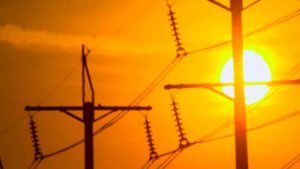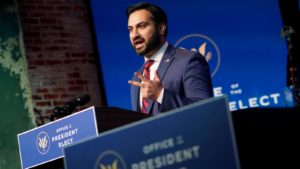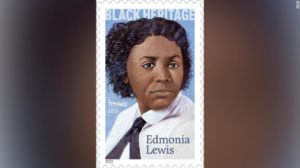Manchin and Sinema are key to preserving democracy. To pass laws ensuring the Capitol riot commission can function, we must weaken the filibuster.
“How shall freedom be defended? [B]y truth when it is attacked by lies.” — Archibald MacLeish, Pulitzer Prize-winning playwright and poet
Congress is about to take one small step for bipartisanship and one healthy step for truth. It will launch the new “National Commission to Investigate the January 6 Attack on the United States Capitol Complex Act” at a hearing Tuesday.
Just days ago, House Homeland Security Chairman Bennie G. Thompson and Rep. John Katko, the committee’s senior Republican, announced their agreement to introduce the bipartisan bill. It creates a commission modeled after the 9/11 Commission to investigate the Capitol insurrection, an attack that injured 140 people and led to five deaths. A violent mob chanting “Hang Mike Pence” came within seconds of finding him.
The commission will be made up of 10 outside experts who will examine the facts and causes underlying the Jan. 6 attack and recommend corrective measures to secure the Capitol and our democratic institutions against domestic terrorism.
Revisionist battle over history
In our tribal times, such an agreement across party lines is remarkable. Rep. Andrew S. Clyde, R-Georgia, a Donald Trump loyalist, recently called the violent invasion “a normal tourist visit.” Another Trump loyalist, Rep. Paul A. Gosar, R-Arizona, described the rioters as “peaceful patriots.” This brewing revisionist battle over history reminds us of what George Orwell wrote in 1984, his scathing allegory on totalitarianism: “Who controls the past, controls the future.”
In terms of preventing recurring attacks, the 9/11 Commission is the model. It made recommendations that helped the country avoid another 9/11 – establishing the Department of Homeland Security and the screening of all airline passengers.
Other countries have also helped create a template. Most famously, South Africa had its post-apartheid Truth and Reconciliation Commission under President Nelson Mandela. It helped a police-state, white supremacist society transition safely into “a modern democratic era,” writes McMaster University professor Bonny Ibhawoh. In 1990, Chile created a Truth Commission following the electoral defeat of its brutal dictator, General Augusto Pinochet. That commission “stripped the military of its control over history,” University of Arkansas professor Eric Wiebelhaus-Brahm wrote in his book “Truth Commissions and Transitional Societies.”
In 1992, following the fall of the Berlin Wall, a unified Germany’s legislature created a Study Commission for working “through the history and consequences” of the East German Dictatorship. The commission’s goal was to solidify “democratic consciousness and the further development of a common political culture in Germany.” By any measure, that goal has been fully realized.
Here, the ultimate success of the January 6 Commission hinges on overcoming several obstacles. First, half the appointments are controlled by House Minority Leader Kevin McCarthy and Senate Minority Leader Mitch McConnell. Both have suggested that a commission should also look into so-called violent demonstrations last summer, reflecting a desire to dilute the focus on January 6. And McCarthy’s continuing fealty to Trump, who cannot be happy about another investigation, casts a long shadow on the potential for a politically disinterested probe.
Second, under the bill as drafted, it takes a majority of commissioners to issue subpoenas, or agreement between the chair (named by majority Democrats) and vice chair (appointed jointly by McCarthy and McConnell). And even if meaningful subpoenas were to be issued, the bill says the commission must complete its work by Dec. 31, presumably because Republicans do not want investigations extending into an election year. That timeline creates incentives for reluctant witnesses to delay their compliance with subpoenas.
Curbing the filibuster is essential
The remedy for this lies in the Protecting Our Democracy Act, which speeds up the ability of Congress to enforce subpoenas. But to pass that bill, Democrats in the evenly split Senate would need Sens. Joe Manchin of West Virginia and Kyrsten Sinema of Arizona to support curtailing the filibuster. That would allow them to prevail with a simple majority – their 50 senators and Vice President Kamala Harris, the tiebreaker.
So far Manchin and Sinema have shown no signs of weakening on the filibuster rule, which requires 60 votes to proceed on a bill. If they had a change of heart, the Senate could also pass the “For the People Act.” In federal elections, it would override the voter suppression measures sweeping Republican states.
The two filibuster holdouts hold the key to preserving our democracy, and pressure on them could rise. New polling sponsored by an election reform group found that79% in Manchin’s West Virginia and 84% in Sinema’s Arizona support the For The People Act. If it’s not passed, even a robust investigation of the Jan. 6 Capitol attack may not diminish the risk of our government’s future control by extremists, such as those seeking to rewrite history around the insurrection.
Dag Hammarskjöld, the legendary 1950s United Nations Secretary General whom President John Kennedy called “the greatest statesman” of the 20th century, once said the U.N. was “not created to take mankind to heaven, but to save humanity from hell.” An independent and empowered January 6 Commission, combined with enactment of the For The People and Protecting Our Democracy acts, can do the same for our republic.
Dennis Aftergut is a former federal prosecutor and Supreme Court advocate who writes on national affairs.




